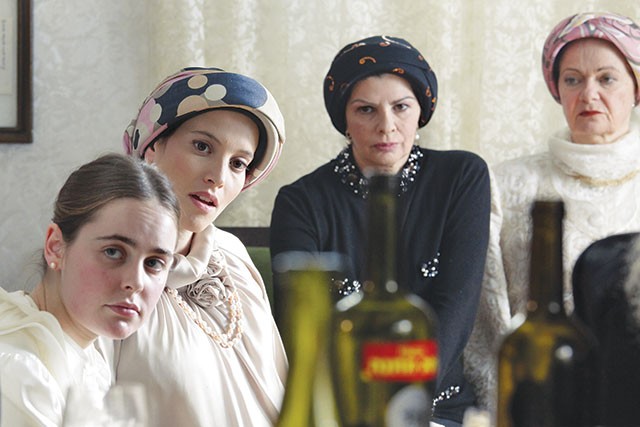Early in Fill the Void, said to be the first mainstream feature film directed by an Orthodox Jewish woman, the serenity of a Tel Aviv apartment is disturbed by loud rock music. Someone closes a window, and the Mendelmans, a devout Hasidic family, can resume their pious lives without distraction from the secular world. Consisting almost entirely of interior shots, writer-director Rama Burshtein’s feature debut confines itself to an insular subculture that refuses to allow Israel’s most worldly city to divert it from Torah. Unlike the cornucopia of recent Israeli imports that includes Waltz with Bashir, Beaufort, The Band’s Visit, and A Bottle in the Gaza Sea, Fill the Void is devoid of Arabs, soldiers and non-believers. What it does contain is an uncommon drama of duty and desire.
The Mendelmans are less disturbed by the distant clamor of an electric guitar than the marital status of their 18-year old daughter Shira (Hadas Yaron). In accordance with their customs, they are arranging Shira’s betrothal to a suitable Hasid when her older sister Esther dies in childbirth. Yochay (Yiftach Klein), Esther’s widower, is left with an infant son and a problem. According to the Talmud, “He who is without a wife dwells without blessing, life, joy, help, good and peace—and without defense against temptation.” So Yochay resolves to marry a widow in Belgium. However, lest she lose her new grandson to a distant land, Shira’s mother Rivka (Irit Sheleg) offers an alternative. She urges Shira to marry Yochay and become the baby’s new mother.
These are taciturn characters who quote Biblical phrases as a substitute for intimate conversation. There are long silences and long takes as Shira struggles with her decision. Yochay is considerably older, and a retread. Plus, marrying her sister’s husband seems creepy, like incest. Nevertheless, Shira is a dutiful daughter, eager to please her family.
Burshtein’s portrait of a patriarchal world in which men sing joyous Purim songs while women huddle in the corner is attentive and affectionate. Neither she nor Shira seems interested in rebelling against a system that values community over individual. Yet, when his marital advice is solicited, a sweet old rabbi asks Shira how she feels. “It’s not a matter of feelings,” she replies. “It’s only a matter of feelings” is his sage rejoinder. With so many other rituals to get them through the day, Burshtein’s people do not watch movies. To moviegoers, they might seem locked in a religious dungeon, but the world of Fill the Void contains enough commitment and compassion to keep their lives from being empty.
Fill the Void (Lemale et ha'halal)
Writ. & dir. Rama Burshtein; feat. Hadas Yaron, Yiftach Klein, Irit Sheleg (PG)
Opens at the Bijou July 26


